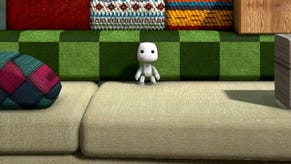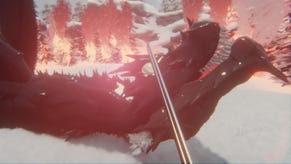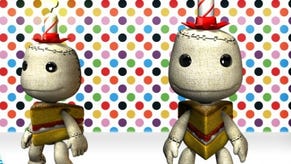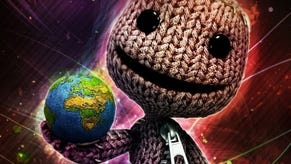GDC: PlayStation 3 - the next level
Home, LittleBigPlanet and PlayStation Edge.
"The cool thing is it's not just about making pre-made objects," Healy said. "You can lift the customisable level, do whatever you want with it, make it look how you want it to look." So, for example, you can create 'stickers' using content on your hard drive, photos taken with EyeToy and so on, and slap them wherever you like. "There's no limit. You can literally cover the entire world."
The first part of the demo only lasted a couple of minutes, but already there was a sense of just how many options and how much freedom LittleBigPlanet will offer. Despite this, the game didn't appear to be too complicated. Everything flowed quickly and smoothly.
There were now four characters on screen - the maximum number of players - with Harrison joining in. They lifted up a giant curtain at one end of the backyard, revealing the start of a previously created game. The object of the game, Healy explained, was to collect a resource: sponge.
At the beginning, the characters were simply running and jumping around a variety of objects, and again everything appeared fast and fluid. They skipped along branches, swung on ropes and zoomed around with jetpacks. Although the players were competing for resources, there were moments where they had to co-operate, combining their strength, for example, to move a heavier object.
All too soon, it was time for the grand finale. The four characters jumped on a giant skateboard and began waving as it zoomed down a steep hill. One of the players pressed a button to take a snapshot of the moment, and the demo was over.
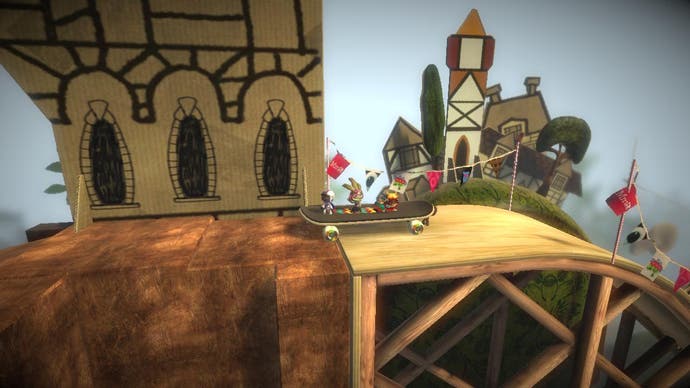
"As you can see, it's all about empowering a community of gamers by embedding the creative tools into the game experience as well, so they don't even know they're editing and creating," Harrison said.
"But the key, after they've edited and created, is to share, so we're going to give you a glimpse of how that could work."
It really was a glimpse. A short, fast film which seemed to suggest that once you've uploaded the game you've created to the PlayStation Network, other users will be able to play and rate it. There was a rankings chart, apparently showing the most popular games on the Network. A messages section to communicate with other users. A forum-style comments feature where you can post your thoughts on the game. It was all over very quickly, and followed by a long and loud round of applause.
Next up was Warhawk, currently best remembered for playing a part in Sony's derided E3 2006 conference. But according to producer Dylan Jones: "The demonstrations that you've seen earlier are just an example of the exciting and innovative ways that Sony is extending the feature set for PlayStation Network.
"It is with that I am incredibly excited to announce a strategic change for the game Warhawk. The exclusively online multiplayer focus will allow the team to leverage many of the features you've seen here tonight. It will allow us to truly deliver a fantastic online war game experience."
It all felt a bit low-key following the excitement of the LittleBigPlanet demo, but then Harrison was back on stage and on to a new topic: PlayStation Edge. "This is something which is very relevant to the game developer audience who will be in the keynote tomorrow, but it's also very relevant to consumers," he said.
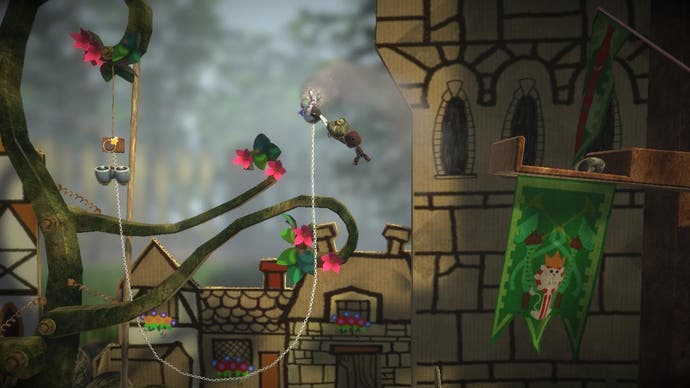
"What PlayStation Edge is all about is taking some of the advanced technology that we have invented within worldwide studios to support the wonderful creativity and technology you've seen in games today, and deliver and give that technology free of charge to PlayStation 3 developers within our PS3 developer network."
That will include GCO Replay,"an incredibly powerful, industry-leading RSX profiling tool". It allows developers to "eke out the highest possible performance from the graphics chip inside the PlayStation 3, and to give incredible feedback to game designers".
He followed this up by revealing that developers will also get "highly optimised" libraries for PS3 in the areas of geometry processing, animation and compression.
"These are tremendous technical and creative advantages that PlayStation 3 has, and we want to give all developers access to the absolute pinnacle of technology," Harrison pledged. A short video of the next Killzone followed, with some amazing animations and effects on show. More on the game is promised for E3 in July.
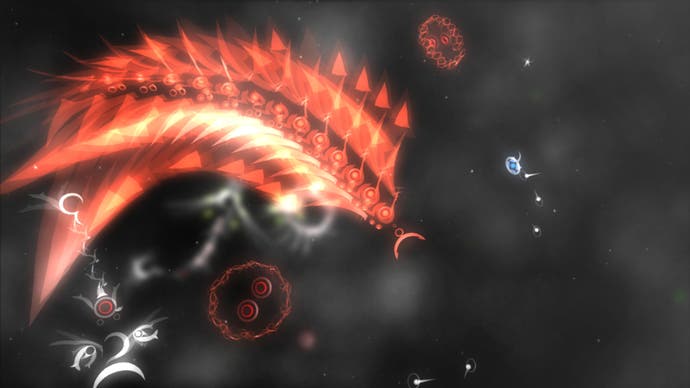
Summing up his speech Harrison told the audience: "You can see that we have a tremendous decade of growth ahead of us, powered not just by the technology of PlayStation 3 but also the kind of experiences we can unlock through the power of Network, which is based around the Game 3.0 concept.
"It's a very exciting opportunity laid out in front of us, and it's one that I hope our developers, our publishers, both internally and externally, embrace, really run with and take to incredible new heights to build some incredible entertainment experiences for PlayStation 3."
So, what conclusions can be drawn now it's all over? Well, LittleBigPlanet was clearly the star of the show. It looks charming, exciting and engaging. The interface appears to be beautifully simple, and there's a stunning range of options for customisation and creativity.
Add to that the option to play other people's games, share your own and get real feedback from real gamers on what they think of your creation. It's clear that LittleBigPlanet could be something really very special indeed.
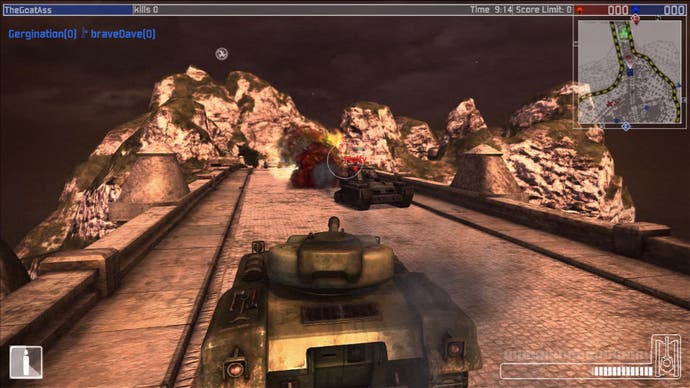
PlayStation Home didn't have quite the same sense of innovation and novelty about it, and there are a few questions still to be answered. Such as, why would you want to watch a game trailer on a virtual telly if you're sitting in front of a real live telly? But Home certainly looked impressive, and it will be interesting to find out just how it will all work.
The big question is whether it will all be enough to silence the doubters once and for all. There's still that big old price tag and port-heavy software line-up to contend with. Both of those problems, however, will be solved over time. And meanwhile, innovative ideas like LittleBigPlanet might go some way to making PlayStation 3 owners feel that that large amount of money has been well spent.
Of course, Sony's harshest critics will accuse them of jumping on the YouTube bandwagon, of failing to solve the real problems with PS3, of mucking about with rubber duckies and giant enemy crabs too much. But maybe it's time to take a closer look on what Sony's doing right, rather than focusing solely on what it's doing wrong. And maybe, for the first time in a long while, Sony is doing enough things right to make that possible.



